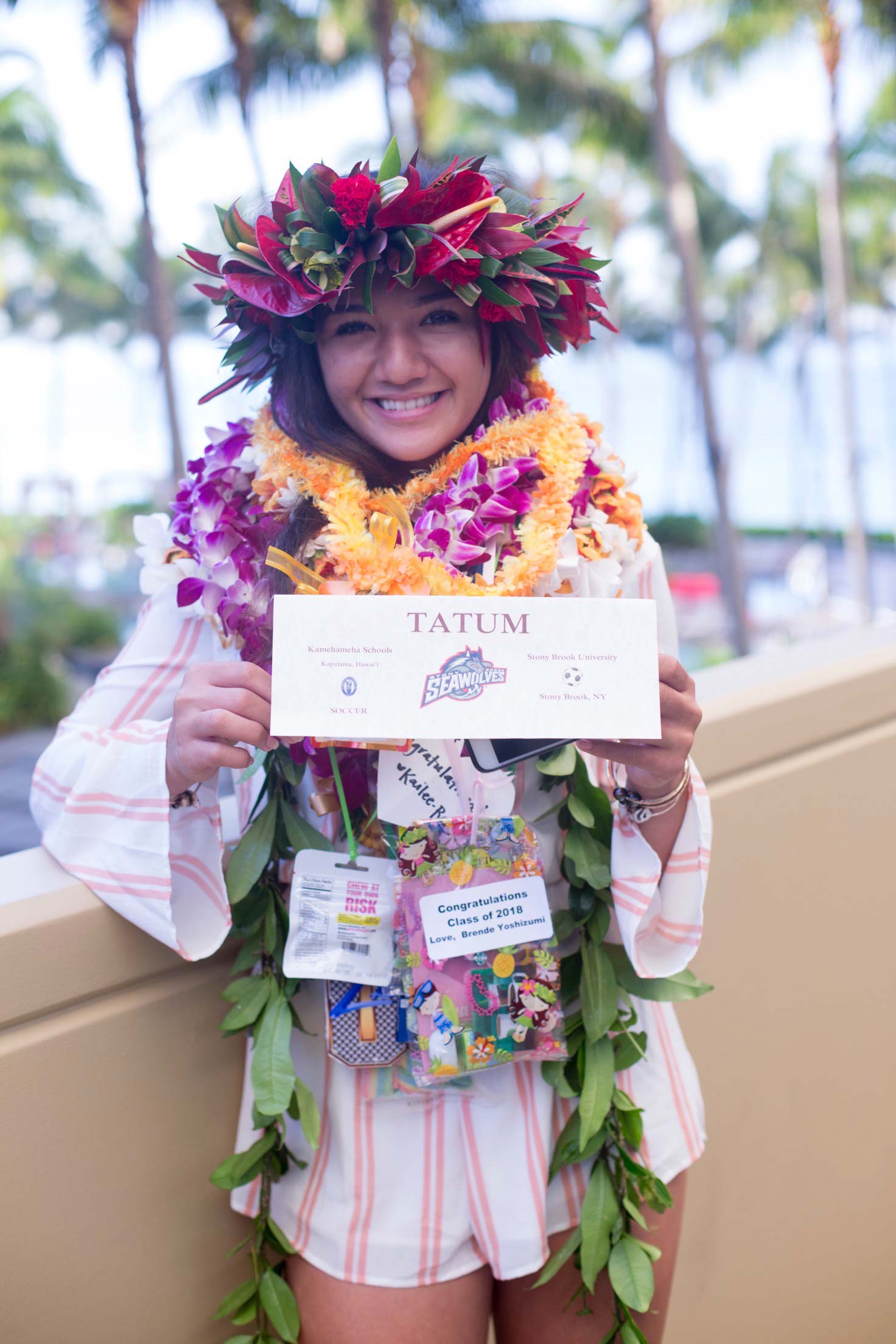
Introduction
Tell Me About Yourself.
I’m Tatum. I go to Stony Brook University. I’m a senior. I graduated from Kamehameha Kapalama in 2018. I’m also a student athlete. And that’s a big reason why I decided to go to school at Stony Brook and I’m really enjoying my time here. Now I’m in my last semester, and it’s so weird because I play soccer. But the main season for that sport is in the fall. So right now is like off-season. So it’s my first semester, basically, like not touching a soccer ball.
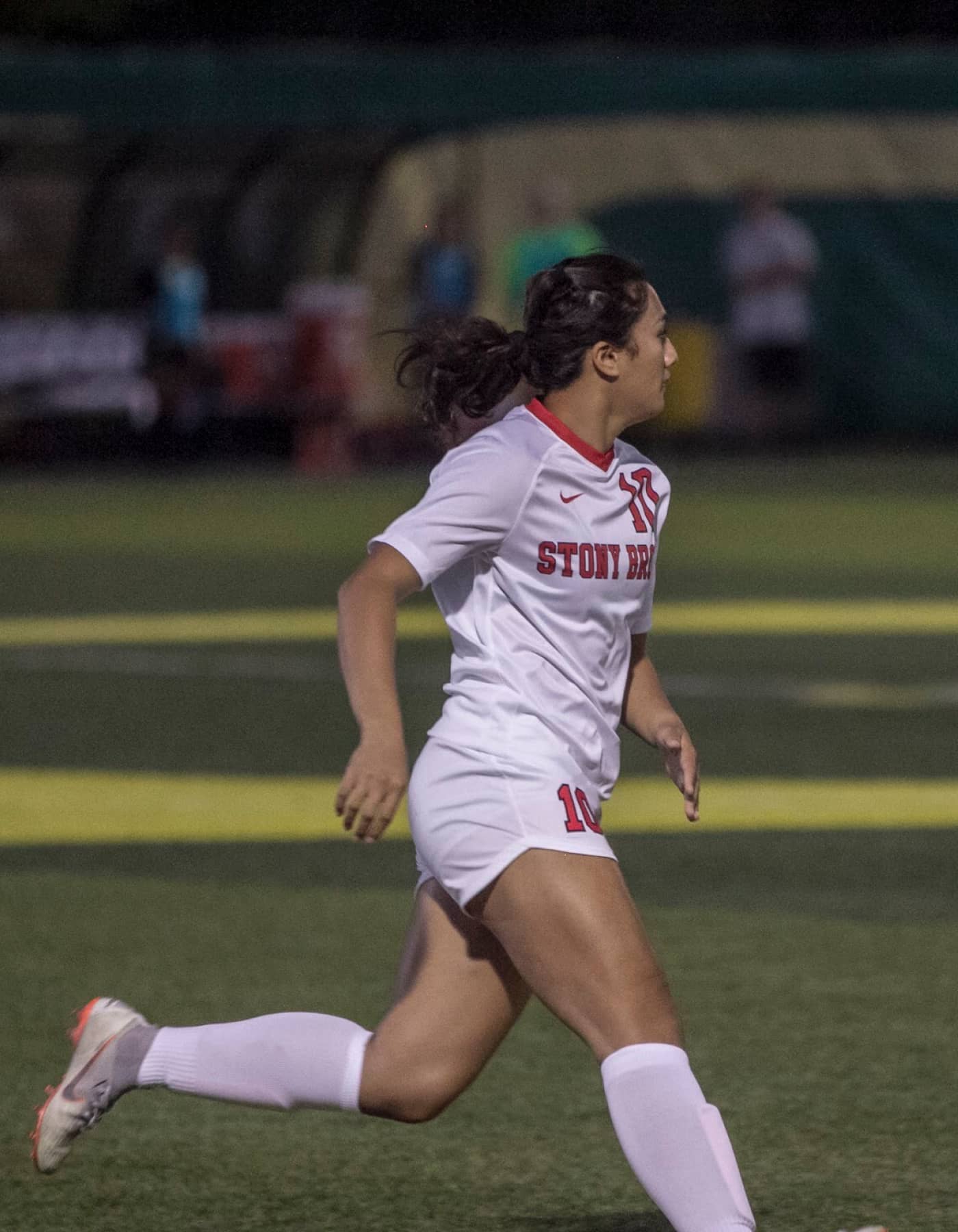
I’m majoring in environmental studies. I’ve always been super passionate about the earth. I’m super outdoorsy. I think a lot of people from Hawaiʻi are. But I don’t know, I grew up in a surfer family, like always at the beach, all day. So I’m into surfing, diving, fishing, even like hikes, you know like like mountains by the beach. We’ll go on a hike together with my family, and then go down to the water. So I’m hoping with my environmental studies degree, I want to go back home and make change to our environment. Like, being native Hawaiian, and growing up in a super culturally invested family,
“I want to somehow benefit not only our environment at home but also Native Hawaiians. I’m not sure exactly how I’m going to do that. That’s my main goal in life is to just help our people, and help our home.”
Being on the east coast is really different from home. In a good way, though, like, I’ve made some of my best friends here. But it’s kind of weird to think, like they don’t understand where I come from. They’ve never been to Hawaiʻi never met my family. And they’ll never know my lifestyle, especially the Hawaiian culture. It’s still not very prominent on the east coast.
“I think there are only three of us that are Native Hawaiian. It’s a very small population here.”
I try to not necessarily spread my culture, but kind of educate others. Me and my team, especially during the Black Lives Matter movement, my soccer team and I, we decided to like have these, not conferences, but little meetings to educate each other, because we have so many international students at Stony Brook. Which is really cool, because that kind of sparked our initiative to want to educate each other.
First Year College Experience
How Was Your First Year of College?
So, my parents are flight attendants. Another big reason why I decided to go to school on Long Island near New York City is that my parents can fly there for free. So that was nice. So I’ve been to the east coast, I think like maybe three times before I actually like moved on campus. But I think the whole moving process, it’s different for us as student athletes, because we have to be here like a month and a half in advance, compared to like when school actually starts. So I came a month and a half before school started. And I had to stay in one of the upperclassmen on my team’s house, which was kind of weird. I remember having to stay on the couch. And that was a little traumatic, just because the house that I stayed in, particularly, like they were party animals. So I don’t know, it was just a little intimidating. But I slept fine, I guess, and it ended up being all okay.
“It was hard, saying goodbye to my parents, and having them drop me off in this house, living on a couch for a few days.”
I’m about to graduate with my Bachelor’s in environmental studies. I originally was a marine science major and Stony Brook University has a really prestigious program. My freshman year, I remember I think I was in some kind of physics class in my first semester.
And then in my second semester in my first year, I was in like calculus two. I realized, okay I do not enjoy all of this science mathematics. So after my first year, that’s when I realized what I actually want to do. Thankfully, Stony Brook had environmental studies. So that was not a challenge. I think it actually was the opposite; I benefited from that because environmental studies is a little broader major. I feel like I can make a bigger difference with that in the long run. So yeah that was one life-changing thing in my first year.
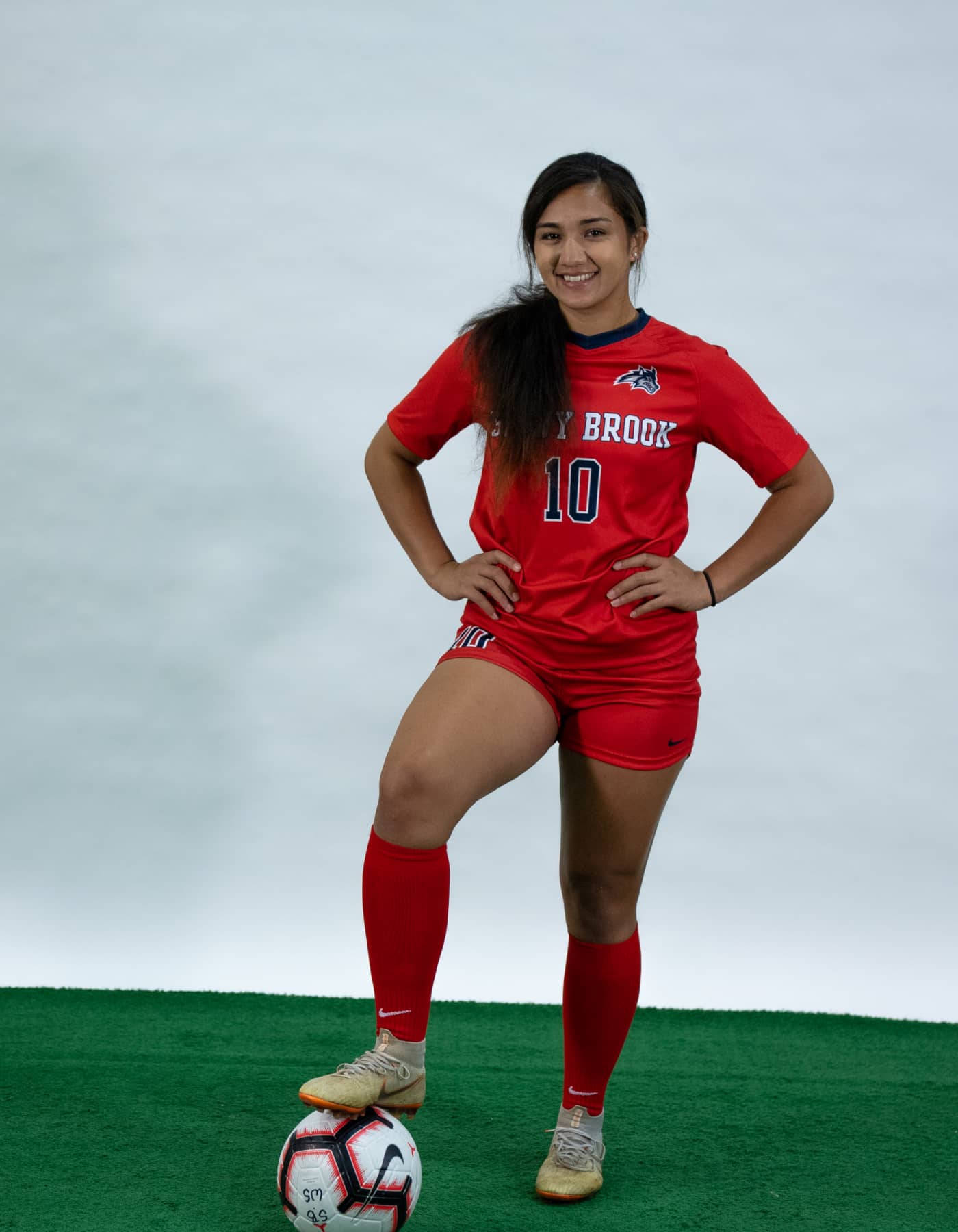
“I didn’t realize how much of a job being a student athlete can be. We sometimes have practice two times. One at 6AM, the next one is at 4pm. You are literally just playing soccer, going to class, and then sleeping. Oh, and eating. There is no in between.”
Stony Brook is a huge international school. My coach at the time, during my freshman year, was awesome. I have some teammates that didn’t really like him. I didn’t at times either. But he was a pretty good coach, like culturally. I didn’t realize how family-oriented my team is until I blended with everyone. And I think it’s honestly because of that coach. I have a different coach now. But the coach at the time had us read this book, it’s called Hard Hat. Everyone on the team really didn’t want to do that. I didn’t know that I’d be reading as a soccer player. But he would make us read that, and it was about basically this athlete in the past, who took charge, and did things when no one was looking. So basically, that book was, I think, my coach’s way of teaching us to do things without being told to and just taking care of yourself and your surroundings, which I thought was really cool.
Another thing in my first year, I thought I would be really homesick, because I am really close to my family. But fortunately, I wasn’t. I think I was just so excited to dive into the college life, and get to know my surroundings, which was awesome.
“Oh my gosh, six and five hours was crazy. So I didn’t really have a lot of time to talk to my family.”
Mental Health Resources
Describe the Climate of Mental Health Resources on Your Campus.
I am aware of these mental health resources on campus. But luckily, like being a student athlete. I’m a part of this mental health group, basically, for student athletes, which is pretty awesome. I’ve gotten to know a lot of the people there well. And that was probably my biggest mental health resource, even though I mentioned we do have the official resources that they allow everyone to go to. And I did go through that system once or twice.
But if I’m being completely honest, I don’t think it got me anywhere. I think I started going through that system, like my school system, it’s called CAPs. But I went through there right before the pandemic started. And I was going through a lot, not eating, not sleeping. And that’s when I realized, “Okay, I got to get help.”
“I found this student athlete group, which actually helped me a lot better. I’m very thankful for that.”
Luckily, through our athletics program, I mentioned this, but the athletic program is super diverse. So I think that’s why I felt even more comfortable with that group. So yeah. One of my best friends from Trinidad, she’s in that group. We had a lot of resources for even black student athletes, which is awesome.
“I don’t think people realize Polynesians are minorities. We don’t necessarily have the specific resources.”
The majority of the staff for the school system, CAPs, is primarily white staff, I would say. Which is, I mean, I don’t feel too uncomfortable. I am white, I have some white family. But I know that there are certain friends of mine that aren’t comfortable with that, unfortunately.
And it’s like, luckily, our school has been trying to make that a bigger issue. It’s cool because a lot of our resources for mental health try to stay connected. So the athletic one and the school system, I want to say they communicated and have been trying to have a more diverse staff. But I know we mentioned it in a meeting. So I hope that’s brought up and change actually occurs soon.
We’re definitely aware, though, of primarily white staffed mental health resources. I mean, I know this doesn’t really affect some people. But I remember when I did go through our school system called CAPs, I had a male counselor. I was going through like boy trouble, especially during that time. I didn’t necessarily feel super comfortable talking about a male with these things. So I wouldn’t completely open up. I think that’s also what might have prohibited me from really benefiting from that resource. Yeah. I think my student athlete group, I’m not sure if there are groups out there for your ordinary student. That kind of makes me sad. I don’t know if there are smaller groups again. I’m assuming so, because CAPs, like I said, it’s not the system that everyone necessarily wants to go through.
I feel like student athlete life is so different, especially at my school. Which is, I guess, a good and bad thing. But, we have so many events and I’m usually there helping out because I am part of that mental health group, and another student athlete club, it’s called SAAC, and its student athlete advisory committee. So we’re the ones who do like plan those events. We had one where we brought, what are they? Oh, emotional support animals. So during finals week, we had the animals come, and it’s kind of just like a de-stressor day. So that was really nice.
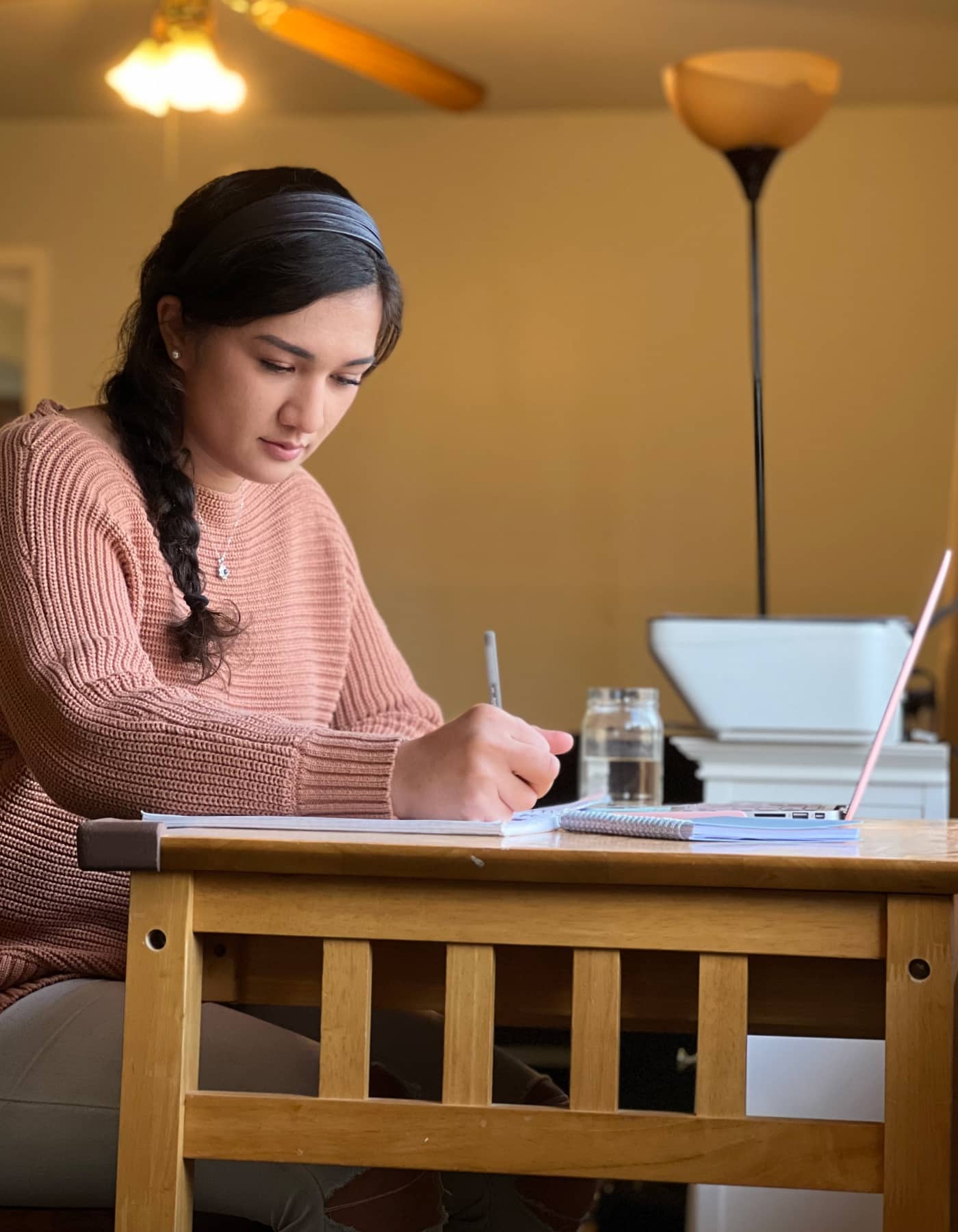
How Do You Deal With Homesickness?
Music is a huge thing for me. Oh yeah, I’m also a singer. Not seriously, but I love to sing. I brought my keyboard up here from home. That’s nice, in my house. Yeah, so I always will blast reggae in my car, if I’m alone.
“My good friend from Trinidad, it’s so cool having her. She listens to reggae too. It was something that we both had in common.”
So that definitely was one of my home remedies. I do like to paint as well. Those are some of my paintings behind me. So some of them are like home, like the flowers, or plants, and stuff. Yeah. I think those were my two biggest de-stressors and reminders of home were music, art. Soccer, soccer just brings back home memories.
Message to Funders
I realize I’m thinking education is something I’m super passionate about as well. That could be about the environment and things at home.
“I learned on the East Coast, no one really knows about us as Native Hawaiians and our culture.”
I don’t know how to word this. It’s kind of simple. But I really do wish more of our entire nation were educated on Polynesians, and like just our lifestyle. I don’t know. Obviously, no one would understand my pidgin. But I can’t even talk how I would at home. That would definitely be one thing I would tell funders.
I can also mention something like a problem at home. This, I’m worried for myself. I am scared to approach this problem in a year, two years. Even a couple of months, when I graduate.
“Foreigners moving to Hawaiʻi is something that bothers me every single day. My friends on the mainland, they don’t really understand. I, honestly, probably won’t be able to live at home for a long time, just because it’s so expensive.”
It really bugs me. I know some people that have moved to Hawaiʻi that went to school with me. It bothers me, but I don’t think they realize how big of a problem it is. I hope there is more to be done about that in the future.
Some quotes have been edited for clarity with the speaker’s permission.

